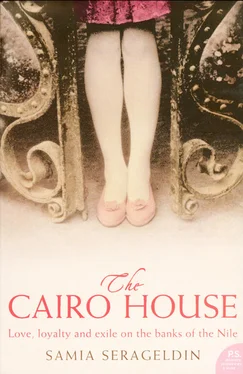Papa and I are standing behind Mama’s Aubusson bergère. Papa never changed that much – because he died young, I suppose – but Mama is almost unrecognizable in the photo. Her black hair is short, she has the thick straight brows, the red lipstick and string of pearls that were the ‘look’ of the period. Her features are too irregular to be photogenic, but her smile is confident. She is wearing a salmon, lace-encrusted tulle dress she kept for years after she stopped wearing it. She is at her slimmest in that photo, and although her shoulders and arms look creamy and plump, the boned bustier of that dress is tiny. I know because I tried it on when I was eighteen. I could only hook up the waist if I sucked in my breath, while the fabric of the hips and the bust hung loose on me.
In the photo I am standing with an arm around the back of Mama’s chair, head tilted to one side, one foot rubbing against the patent leather heel of the other foot. My shoulder-length hair is brushed back in a velvet Alice band. It was chestnut brown in those days and Mama rinsed it with camomile tea to bring out the highlights. I am wearing a sweater set over a short pleated skirt, and my legs are coltish and long. I am nine, on the verge of l’âge ingrat, as my governess called it, the awkward age.
Just before the photograph was taken, Mama had hurriedly tried to smooth my eyebrows.
‘Stand still, Gigi!’
She had wet the tip of her finger with her tongue and run her finger over my brows. I remember making a face. It’s the same face my son makes today when I take a sip from his drink, or in some other way betray the fact that I still don’t see him as his own person, physically separate from me.
Old photographs are like a deck of worn cards; you can try to read them like a fortune-teller at a fair, except in reverse: to read the past, rather than the future. With hindsight you recognize the people in them for what they were: the king, the joker, the knave, the hangman. The Pasha, of course, would be the King, the Sha’ib or Graybeard, as he is called in Arabic; Fangali the jester; Om Khalil’s black figure the hangman, turning up like an ill omen at unexpected junctures. But only with hindsight. While the cards are face down, you cannot tell what hand you’ve been dealt.
That photo of me with my parents was taken just before the Feast of the Sacrifice the year I turned nine. It was the last time we ever posed together for a family portrait.
The Feast of the Sacrifice must have been in winter that year. The sheep had arrived two days before amid much commotion, an incongruous sight in a residential neighborhood in Cairo. Sheep or cattle were sacrificed on the family estate, but it was also customary to carry out the ritual in Cairo. This imperative was never questioned: it was one of the many instances in our hybrid culture when Western norms were unhesitatingly sacrificed on the altar of tradition.
The Bayram Feast was meant to ransom one’s blessings, as Abraham did by his sacrifice. Health, wealth, and the greatest of blessings, children, could be withdrawn on a whim of the Giver. The Revolution of 1952 was nearly a decade old, and the Land Reform Act had stripped the bulk of our landholdings, but the worst was still around the corner for families like ours, and as yet unimaginable.
The distribution of the meat from the sacrificial beast was a symbolically intimate form of charity, sharing with dependents and mendicants the meat from one’s own table. For the sacrifice to be accepted, every detail of the ritual had to be carefully observed, such as the exact window of time during which it should be performed. That year that was to be the last of the good days, there was a hitch, the lapse of a fatal few minutes. In retrospect, it was an ill omen, and I was the one responsible for it.
I remember watching from the balcony when the van arrived with the two sheep in the back. The cook, his helper, the chauffeur and Ibrahim the Nubian doorkeeper then proceeded to drag the bleating, resisting beasts to the dog run where they would be penned until the morning of the feast.
There was a sudden commotion and panic; someone had forgotten to chain up the dog, who had come flying at the throat of the ram. The howling German shepherd was dragged away. Finally the sheep were safely enclosed. Two days later, before dawn on the day of the Feast, they would be taken to a shed in the backyard that was ordinarily used once a week by two washer-women who came to do the laundry, then on the following day by a man who came to do the ironing. The dog was also bathed there. But on that one day of the year, between dawn and daybreak, as tradition required for the sacrifice to be valid, the sheep would be slaughtered and skinned in that room, and the stench of blood would replace the scent of soap and starch. Then the walls and floor were hosed down and everything returned to normal for another year.
On the morning of the day before the Feast the bustle around the house had reached a pitch of controlled frenzy. In the salon, the Sudanese head- suffragi stood on top of a tall ladder, painstakingly unhooking the crystal drops from the chandelier, one by one, to be wiped with vinegar and water. Mama supervised, hair in curlers under a chiffon cap, wearing one of her favorite déshabillés : a faded, blue satin, shawl-collared affair with a sweeping skirt. Mama only dressed to go out, and then she spent at least an hour in front of her tulle-skirted vanity and her modern built-in closets.
The under- suffragi was pushing a heavy contraption across the parquet floor to polish it; twice a year the hardwood floors were hand-stripped with steel wool, cleaned, waxed, then polished with a chamois cloth weighed down by a massive brick of lead at the end of a stick. He pushed the unwieldy contraption forward and dragged it back with a clicking, sucking sound. One of the maids was using a bamboo duster to beat the back of a rug slung over the railing of the balcony.
I stood on the balcony at a safe distance from the dust raised by the maid, watching the arrival of the sheep. I remember the scent of jasmine from the bushes under the balcony – jasmine and dust. The cook came up to the balcony with some carrots to coax me to feed the lamb. A large, garrulous man with terrible burn scars on his chest, he was sweating from his recent efforts and the general excitement. All the household help seemed to go around with unusually dilated pupils in the days leading up to the Feast. ‘Blood lust’, my mother called it. The cook proudly pointed out the two animals to me, a ram and a lamb.
‘See the pretty little one, I chose him just for you.’
He went on to make a remark about the ram’s horns and his virility. I had the uncomfortable feeling that the remark qualified as one of the ‘indelicate expressions’ to which the cook was unfortunately prone, and on account of which I was discouraged from engaging in conversation with him. The poor man was aware of this failing of his, without quite being able to determine how he offended. The comical result was that he prefaced his remarks with a precautionary ‘excuse the expression,’ as when he referred to a breast of chicken or a leg of lamb.
I went back inside, up to my room, and whiled away the afternoon styling my long-suffering governess’ hair. Madame Hélène was over sixty, but she still had long, lush hair which she wore in a dowdy forties bun. I loved to pin her silvery hair up in complicated twists and braids. She always undid my fantastic creations before venturing out.
A persistent bleating from the backyard was followed by the dog barking. ‘Oh, listen to that bleating,’ Madame Hélène grumbled. ‘At least tomorrow it will all be over and we’ll have some peace and quiet.’
Читать дальше











